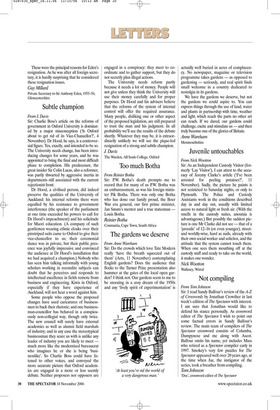Subtle champion
From J. Davis
Sir: Charlie Boss’s article on the reforms of government in Oxford University is dominated by a major misconception (‘Is Oxford about to get rid of its Vice-Chancellor?’, 4 November). Dr Hood, he says, is a controversial figure. Yes, exactly, and intended to be so. The University needs change, has been introducing changes for some years, and he was appointed to bring the final and most difficult phase to completion. His predecessor, the great insider Sir Colin Lucas, also a reformer, was partly thwarted by aggressive inertia in departments still associated with the current rejectionist front.
Dr Hood, a civilised person, did indeed preserve the qualities of the University of Auckland: his internal reforms there were equalled by his resistance to government interference (the speaker of the parliament at one time exceeded his powers to call for Dr Hood’s impeachment) and his solicitude for Maori education. (A company of such gentlemen wearing ethnic cloaks over their pinstriped suits came to Oxford to give their vice-chancellor to us; their ceremonial dance was in private, but their public presence was joyfully impressive and convinced the audience at Dr Hood’s installation that we had acquired a champion.) Nobody who has seen him talking informally with young scholars working in recondite subjects can doubt that he perceives and responds to intellectual excellence in fields remote from business and engineering. Kiwis in Oxford, especially if they have experience of Auckland, will not hear a word against him.
Some people who oppose the proposed changes have used caricatures of businessmen to back their rhetoric; and one businessman-councillor has behaved in a conspicuously non-collegial way, though only twice. The new council will surely have external academics as well as alumni field marshals of industry; and in any case the stereotypical businessman they scare us with is unlike any leader of industry you are likely to meet much more like the modernised bureaucrat who imagines he or she is being ‘businesslike’. So Charlie Boss could have listened to other voices, and conveyed the more accurate picture that Oxford academics are engaged in a more or less seemly debate. Neither proposers nor opposers are engaged in a conspiracy: they meet to coordinate and to gather support, but they do not secretly plan illegal actions.
The University needs reform partly because it needs a lot of money. People will not give unless they think the University will use their money carefully and for proper purposes. Dr Hood and his advisers believe that the reforms of the system of internal control will offer the required assurance. Many people, disliking one or other aspect of the proposed legislation, are still prepared to trust the man and his judgment. In all probability we’ll see the results of the debate shortly. Whatever they may be, it is extraordinarily unlikely we will see the pique-led resignation of a strong and subtle champion.
J. Davis
The Warden, All Souls College, Oxford


































































































 Previous page
Previous page